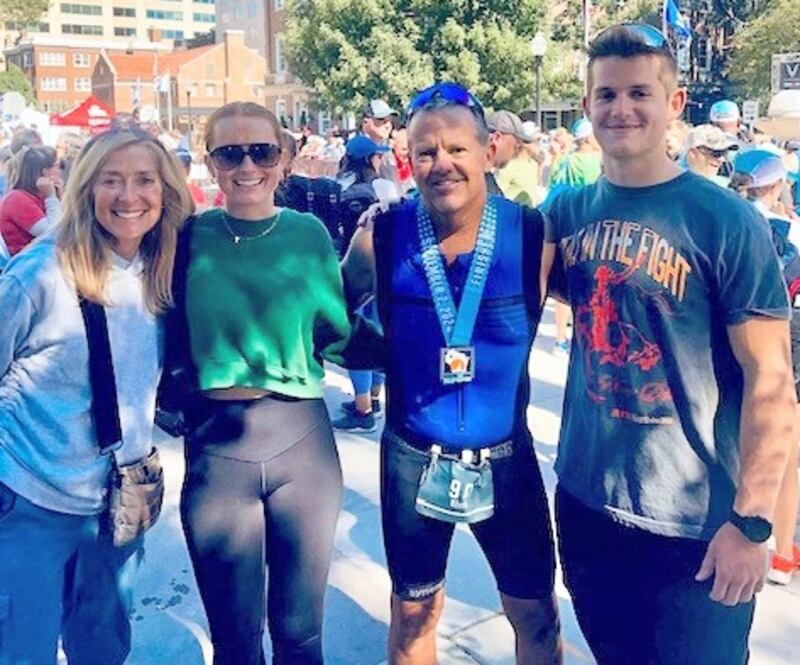GENEVA – Things were going well for Keith Giffney of Geneva in 2023.
He and his business partner signed on together in an engineering staffing firm and were going strong for 14 months.
He was training every day for one physical challenge or another – an Ironman or triathlon.
Then just before Thanksgiving, Giffney felt something rubbing against his tongue.
“At some point, I thought I’d get it checked out,” Giffney, 56, said. “I went to the doctor in December and he gave me a prescription for antibiotics. He thought it was an infection. I went back in January.”
A CT scan, an MRI and a biopsy revealed he had a squamous cell carcinoma of the left tonsil. Squamous cells are found in the outer layer of skin and the lining of internal organs.
A PET scan – positron emission tomography that uses a radioactive tracer to check for disease – showed the cancer spread to the lymph nodes in his neck and upper chest, classifying it as stage 4.
When Giffney told his business partner, the partner stayed.
“He said, ‘I’m in it whatever we’re doing here,’ ” Giffney said. “He didn’t know I wasn’t going to die.”
From February to June 2024, Giffney endured 12 rounds of chemotherapy and 35 rounds of radiation.
And while Giffney lost his hair, he didn’t get sick. Instead, he continued training five to six days a week.
“There’s a certain routine,” Giffney said. “Swimming every day, doing running in the morning a few miles then swimming a mile. The next day biking 20 miles and running a couple miles. ... You try to replicate a mini triathlon.”
Cancer free
The treatments killed the tumor. Giffney soon was cancer free.
Two months later, he did a Half Ironman consisting of a 1.2 mile swim, a 56-mile bike ride and a half-marathon run of 13.1 miles in Madison, Wisconsin, on Sept. 7, 2024.
Giffney finished in seven hours and 12 minutes.
He said having cancer and going through treatment brought him closer to his faith. The training regimen gave him purpose and focus.
And Giffney accepted that he could not do it on his own. He had to “really lean in on God to get through it,” he said.
“I feel like Keith showed incredible strength through a tough course of treatment of chemo and radiation. And to his credit, even on the hardest days, he showed up.”
— Dr. Adil Akthar
Fighting cancer also offered an opportunity to be a role model for his children.
“To show whatever adversity, I was not going to let it destroy me, not get me down and that they have a father who will fight through anything,” Giffney said.
Now he’s training for the Door County Triathlon on July 10.
:quality(70)/cloudfront-us-east-1.images.arcpublishing.com/shawmedia/LY3TYPIEZZCLFEO4BM6WDEMY7Y.jpg)
One of Giffney’s doctors, Dr. Adil Akthar, a radiation oncologist with Northwestern Medicine at the Delnor Cancer Center in Geneva, said his patient’s successful outcome was the result of a team effort.
“I feel like Keith showed incredible strength through a tough course of treatment of chemo and radiation,” Akthar said. “And to his credit, even on the hardest days, he showed up. And that’s the kind of strength that allowed him to complete the different triathlons and milestones he is able to do now.”
A preventable cancer
Giffney’s cancer was caused by the human papillomavirus, also known as HPV, Akthar said.
“The human papillomavirus is becoming a common cause of the cancers in the oral pharynx,” Akthar said. “We’re seeing a very big shift from the causes we used to see, which were historically primarily alcohol and tobacco use. There is a rising trend toward seeing more cancers related to this virus and less that were caused by directly by alcohol and tobacco use.”
A vaccine prevents this type of cancer, Akthar said.
“This can become preventable in a decade or two if we can get all the kids vaccinated,” Akthar said.
The HPV vaccine is recommended for routine vaccination at age 11 or 12 years, but it can be administered at age 9, according to the U.S. Centers for Disease Control and Prevention.
It is a two-dose vaccination, with the second dose given six to 12 months after the first, according to the CDC. Three doses are recommended for teenagers and young adults who start the series at ages 15 through 26.
The reason for getting the vaccine so young is it is most effective before someone becomes sexually active, Akthar said.
“Even between the ages of 13 to 26, if you’ve not gotten vaccinated, you can catch up,” Akthar said. “Once you’re 27 and beyond, it’s not recommended to get vaccinated. If you’re going to get it, you got it.”
The American Cancer Society reports that the human papillomavirus is known to cause cancers of the mouth and throat, cervix, vulva, vagina, penis and anus. More than 37,000 people get HPV-related cancers in the U.S. every year.
“We can prevent it,” Akthar said. “It’s crazy to think that you could get vaccinated and prevent it or go through 35 rounds of radiation, chemo and surgery.”

:quality(70)/s3.amazonaws.com/arc-authors/shawmedia/60b440fb-de03-49ae-806d-b8b5464dcba0.jpeg)